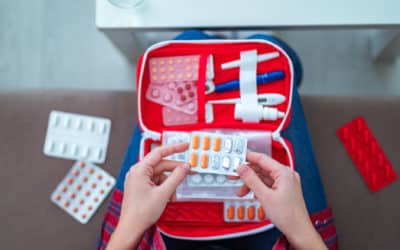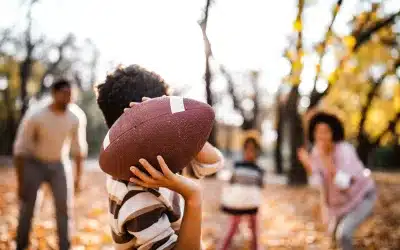Nausea, vomiting, and diarrhea in kids can be extremely uncomfortable for both the child and the caretaker. KidsStreet is here to educate you on the causes, symptoms, treatment options, and prevention methods.
What Are The Causes?
Diarrhea, vomiting, and nausea in children can be the direct cause of many illnesses. In fact, your child may experience each of these if they are dealing with a stomach flu of some sort. Some of these include:
- Viral infection
- Food poisoning
- Food allergy
- Intestinal obstruction
While all of these can cause these, there are many other reasons your child may be experiencing these, such as an underlying health problem.
What Are The Symptoms?
Symptoms of Nausea
Nausea is often -but not always- a precursor to vomiting and/or diarrhea. The symptoms include:
- Abdominal pain
- Cramps
- Loss or lack of appetite
- Sweating
- Retching or dry heaving
- Dry mouth
If the child’s nausea persists for more than 48 hours, see a medical professional. Additionally, if your child has a stiff neck, visit the emergency department immediately, as this could be a sign of meningitis.
Symptoms of Vomiting
Although vomiting is a symptom in and of itself, it may also be accompanied by symptoms such as:
- Gagging
- Retching
- Choking
- Involuntary stomach reflexes
- Mouth filling with saliva
Symptoms of Diarrhea
Similarly to vomiting, diarrhea may also come with its own set of symptoms, including:
- Loose, watery stools
- Mucus in the stool
- Bloating
- Urgency and frequency to have a bowel movement
- Fever
- Nausea
What Are The Treatment Options?
It is important to try to treat the symptoms of nausea, vomiting, and diarrhea quickly, as they can lead to dehydration if they are prolonged. Each of these illnesses has similar treatment methods, but these methodologies may not always be effective.
Diarrhea, nausea, or vomiting in children can be treated by utilizing these methods:
- Get them to drink small amounts of fluid, such as water or broth.
- Try to get them to eat bland foods such as the BRAT diet. The BRAT diet includes bananas, rice, applesauce, and toast. You can also try crackers.
- Give them over-the-counter nausea medications such as Pepto Bismol,
Still struggling to treat your child? No worries! KidsStreet offers treatment for nausea, vomiting, and diarrhea in our urgent care services for kids.
When To Visit A Provider
Although each of these illnesses is fairly common, they can be dangerous if left untreated. Take your child to a medical provider immediately if:
- Their vomit has blood in it.
- Their vomit is green.
- Vomiting or diarrhea persists for more than 48 hours.
- Your child has a high fever accompanying their symptoms.
- Their stool contains blood.
- You believe your child is suffering from dehydration.
- The child has not eaten or drank anything in more than 24 hours.
- The child is having over 10 watery stools per day.
- The child is vomiting 8 or more times a day.
- Intense stomach pain while not vomiting or having diarrhea.
If your child experiences vomiting, diarrhea, or nausea frequently, it may be time to talk with their provider. This could be a sign of an underlying health issue or allergy.
Signs and Prevention of Dehydration
If your child is vomiting or having diarrhea for an extended period of time, it can lead to dehydration. Signs of dehydration include:
- Intense thirst
- Clammy or cool hands and feet
- Increased exhaustion
- Urinating less frequently
- Brightly-colored and strong-smelling urine
- Dry mouth and tongue
- Headache
- Dizziness
- A sunken soft spot in infants
- Slow blood refill test (push on the fingernail to make it turn white, then see how long it takes for it to regain color).
To prevent dehydration, ensure that you are using proper oral rehydration solutions. Make sure that your child drinks frequently as well as has plenty of electrolytes. Drinks that help prevent dehydration include:
- Water
- Sports drinks
- Coconut water
- Pedialyte
- Various broths
If your child is experiencing severe dehydration and cannot drink, they may need IV fluids or medications to help ease their symptoms.
Preventing Nausea, Vomiting, and Diarrhea
Although these conditions may be hard to prevent, there are many ways you can reduce the chances that your child will begin experiencing them. Some prevention methods include:
- Washing your hands after playing with other kids or being in crowded areas to prevent viral infection.
- Taking note of any trigger foods that cause these symptoms.
- Maintaining a healthy, balanced diet.
- Checking the expiration labels on all food, especially meats and dairy products.
Turn To KidsStreet Urgent Care
Is your child struggling with vomiting, diarrhea, or nausea? KidsStreet Urgent Care can help them heal and feel better, fast!
To visit our clinic, register online. You and your child will be able to wait from your home or vehicle until we’re ready to see you.
Walk-ins are always welcome! However, please note that registering online reduces in-clinic wait times. Walk-in patients are added to the same queue as those who register online.



